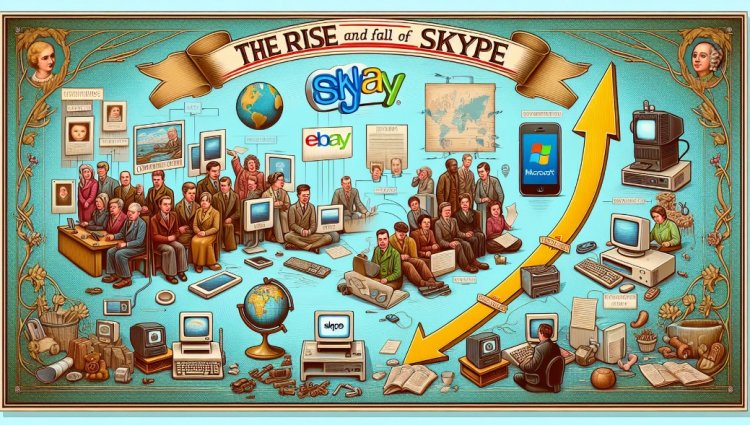The Rise and Fall of Skype: From Innovation to Nostalgia
Skype's journey from a revolutionary communication tool to a nostalgic relic. Dive into its rise to prominence, its decline, and the lessons learned along the way

Introduction
Hey, do you remember that famous Skype ringtone that we all used to hear all the time? Skype used to be a really cool way to talk to people, but now it's kind of old-fashioned. It just goes to show how quickly technology can change. In this blog, we're going to talk about Skype—how it became so popular, how Microsoft bought it, and how it started losing its shine as new competitors came into the picture and people's preferences changed. It's going to be an interesting story, so stick around!
The origins of Skype
Skype started back in 2003 when a bunch of childhood buddies from Estonia, along with some Scandinavian entrepreneurs named Niklas Zennström and Janus Friis, got together and launched it. These folks came up with an idea to change the way people communicate across borders. Back then, most people didn't use the Internet to make phone calls, but Skype wanted to change that.
The folks who made Skype were a bunch of smart engineers who didn't know much about telecommunications stuff. Their different way of thinking gave them the ability to come up with something new and innovative, which was nothing like the usual telecom services. Their previous experience in making computer games and creating the peer-to-peer file-sharing platform Kazaa also helped in making Skype.
The Early Success of Skype
Skype became popular really fast and got more than 11 million users in just one year. Skype was a hit because it was simple and easy to use. It lets people make and get calls over the Internet using voice-over-IP technology. In 2005, Skype had a whopping 59 million people sign up, and it was downloaded more than 182 million times all around the world.
One of the things that made Skype successful was how it spread like wildfire. Back in the day, if you wanted to talk to someone on Skype without paying, you had to send them an invite to join the platform. The user base grew quickly because of the natural growth. Skype became really well-known for being a way to talk to people online for free, and a lot of people started using it.
Ebay's Acquisition and Lack of Synergies
In 2005, eBay bought Skype for a whopping $2.6 billion. They wanted to bring Skype to their online shopping website. But the purchase didn't meet its expectations. eBay had a hard time figuring out how to make their current businesses work well with Skype. The product was really complicated, and it was hard to make it work with eBay's platform.
When eBay took over Skype, it kept on growing and had more than 200 million people signed up by the end of 2007. But it was clear that they didn't come up with any new ideas and missed out on making the most of what Skype could offer. In 2008, this guy named John Donahoe became the big boss at eBay, and he decided to sell off Skype.
Microsoft's Acquisition and Integration Efforts
In 2011, Microsoft bought Skype from eBay for a staggering $8.5 billion. Microsoft bought Skype so they can use it in their stuff like Xbox, Outlook, and smartphones. The aim was to make use of Skype's popularity and smoothly incorporate it into Microsoft's system.
But Microsoft had some difficulties completely merging Skype with its products. Skype didn't grow much because they didn't come up with new ideas and didn't keep up with what people wanted. Apps like WhatsApp and Zoom became more popular for communication, leaving Skype in the dust.
The Rise of Competitors and Skype's Decline
Apps like WhatsApp and Zoom became popular because they were simple and easy to use. Meanwhile, Skype turned into this big, slow, and confusing mess. Microsoft tried to make Skype better, but it didn't work out. People started using other platforms instead of Skype.
So, Microsoft came out with this thing called Teams back in 2017. It turns out, it's like a rival to Skype. Teams had more stuff and things that Skype didn't have. Microsoft focused a lot on making Teams a top choice for communication, but unfortunately, they didn't give the same attention to Skype.
Because of the COVID-19 situation, people started relying more on virtual communication. Apps like Zoom and Teams have become really popular for connecting with others. Skype's user base got smaller as more people started using other options instead.
The Uncertain Future of Skype
I'm not sure what's going to happen with Skype in the future. Microsoft is really putting all their efforts into making Teams the go-to communication platform, while Skype is slowly losing its importance. Skype may have around 36 million people using it every day, but it's not as popular as other stuff you find on the internet.
I'm not so sure about Microsoft's focus on making money and how it will affect Skype in the long run. The platform has been having a hard time making a lot of money, and we don't really know much about the user data and how much money it's making. Microsoft is really dedicated to making sure Skype is great for everyone, no matter what device they use. So, it seems like Skype will still be around, but maybe not as awesome as it used to be.
The legacy of Skype
There's no denying that Skype has had a big impact on how we communicate. It was really important in making free voice calls online popular and helped other similar platforms grow. Skype did what it set out to do—it gave a bunch of people the ability to talk to each other for free using the internet.
Even though Skype isn't as popular as it used to be, people who used it in the beginning will always have a special connection to it. The story of Skype is a good example of how technology keeps changing really fast and how important it is to keep coming up with new ideas to stay ahead in a tough market.
Conclusion
Skype's transformation from a cool communication app to a thing of the past shows how technology keeps evolving. Skype had a good start, and lots of people started using it, but then they had a hard time keeping up with what people wanted and dealing with new competition. Microsoft tried really hard to make Skype better, but it just didn't work out. Not many people were using it anymore.
Skype's future is still up in the air, but we can't deny its impact as a trailblazer in online communication. The story of Skype going up and then down teaches us a good lesson, especially for tech companies. It shows how important it is to keep coming up with new ideas and staying ahead of the game so that you don't end up being left behind.



 admin
admin 










